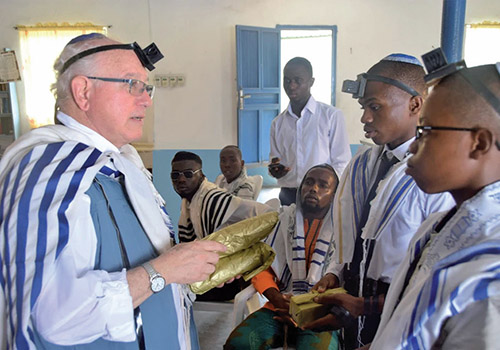
When was the last time you heard of friends packing their bags and securing airline tickets to attend a bar mitzvah—in sub-Saharan Africa? Yet that’s precisely what happened six months ago, when a delegation of three left their more familiar Jewish haunts in New England to wend their way to a synagogue in the southeastern pocket of the “Giant of Africa” (with a population of almost 200 million).
Actually, a bar mitzvah is not all that uncommon in Nigeria. Geographically positioned across 13 states in five different regions, thousands of Nigerian Jews constitute the fastest-growing Jewish community on the continent, with new synagogues regularly sprouting up to join the dozens already thriving. What was unprecedented about this simcha (celebration) in Port Harcourt, Nigeria’s sixth-largest city, is that it was officiated by a rabbi—a Texas-born and -bred American rabbi with a nearly four-decade career at a New England pulpit. Given that every Nigerian shul has a rosh but none has a rav, an actual rabbi as officiant was a unique honor—and opportunity. Accordingly, the rosh of Har Shalom Synagogue in the city of Aba, less than two hours’ drive from Port Harcourt, requested that his 16-year-old son also be included in the ceremony. The parents of the bar mitzvah boy from Yisharim Synagogue in Port Harcourt graciously acceded to the request, and thereby facilitated a double mitzvah—a double bar mitzvah.
Approximately 30 million Nigerians issue from the Igbo tribe, concentrated in the southeast of the country. Many of them believe that all Igbos share another tribal identity—as members of one of the lost tribes of Israel. Scientifically verifiable or not, it is incontrovertible that, beginning a few decades ago, a small core of Igbos began to adopt and practice rabbinic Judaism, observing the mitzvot, as best they can, as do their brothers and sisters all over the globe.
Modern Judaism in Nigeria spawned as a break-off movement from a strain of Christianity that already emphasized the Old Testament basis of the religion. (There was already some local ideological rejection of Christianity as an artefact of British colonialism.) Some of these Christian Igbo spiritual searchers began questioning core elements of New Testament theology. Further reading about Jews and Judaism, occasionally spurred by random encounters with visiting Israeli businessmen and construction-company employees, tipped the balance for some and spread by word of mouth. Igbo embrace of Judaism then accelerated on account of what we all know—the advent of the internet. Social media has also enabled individual Nigerian youths to find and communicate with other youthful Jews in different states across the country, stay connected, grow the faith and strengthen their belief. Jewish learning, especially within the
southern territory of Nigeria, is growing, with Hebrew schools run by some synagogues and a yearly national Youth Shabbat introduced by Gadi Bentley, a young Israeli frequent visitor to Jewish Nigeria.
So why do so many people in the world keep asking, “Are there really Jews in Nigeria?”
The double weekday bar mitzvah in Port Harcourt was a highlight of the “Franklin-Miles Tour to Jewish Nigeria 5779” (details of which are available on the blog Jewish Nigeria). Rabbi Wayne Franklin of Temple Emanu-El in Providence, Rhode Island, and his wife, Dr. Anne Presser Franklin, were guided by one of their congregants, Professor William Miles of Northeastern University (author of “Jews of Nigeria: An Afro-Judaic Odyssey”).
The purpose of the tour was to discover and learn more about the lives of the Nigerian Jews. Over the course of 17 days, the tour took in 13 synagogues in four regions and included three spirited shabbatot in Abuja (Nigeria’s capital), Port Harcourt and Lagos (the economic epicenter). Despite the unfamiliar tropical heat and often exhausting pace, the rabbi kept on teaching Torah and Hebrew.
To those residing in a raucous and often fractious developing nation, one of the beauties of Judaism is the strength of its functional communities, integrated and increasingly connected by boundary-hopping technology. Nigerian Jews view such missions as opportunities to strengthen the Judaism network by promoting communal growth and economic development.
The visit of the three American Jews to the “Garden City” of Port Harcourt was sandwiched between the first leg in Abuja and the third one in Lagos. The colorful double bar mitzvah honored Shimshon ben Matitiyahu, the son of the rosh of the host Yisharim Synagogue and Tovia ben Derekyahu. Jews travelled from all parts of Rivers State and neighboring regions to grace the occasion and witness the historic combined mitzvah rituals of two sons of roshim from two different states. Scheduled for that same afternoon were a general and “for Jewish women only” seminars. With over 200 Jews in attendance, it was one of the most memorable events in Nigerian Jewish history.
Referencing the Torah portion of the week, Rabbi Franklin prayed that God bless Tovia and Shimshon just as Jacob prayed for blessings from the angel who protected him from ill. Then he highlighted the importance of generational continuity—remembering where we come from, recalling who helped you get there, and knowing that you have responsibilities to carry down to your children and grandchildren. The rabbi concluded by praying for sustained growth in the highly spiritual community of Jews in Nigeria and for strengthened unity, harmony and understanding within it. Expressing his happiness, he also promised to recount in America the stories of his maiden visit to Africa.
Receiving separately wrapped gifts from Rhode Island, the celebrants graciously thanked the rabbi and prayed to Hashem for a safe return of the American Jews to the United States.
Tovia was thrilled by the coincidence of a visit from America during his scheduled bar mitzvah celebration. Both he and Shimshon felt highly honored to have a visiting rabbi deliver the dvar Torah (sermon) on their bar mitzvah day.
“I am one of the luckiest Jewish boys in Nigeria!” Tovia exclaimed.
Avraham ben Avraham is a Nigerian Jewish writer, blogger and entrepreneur.
By Avraham ben Avraham/Jpost.com
(reprinted with permission)













